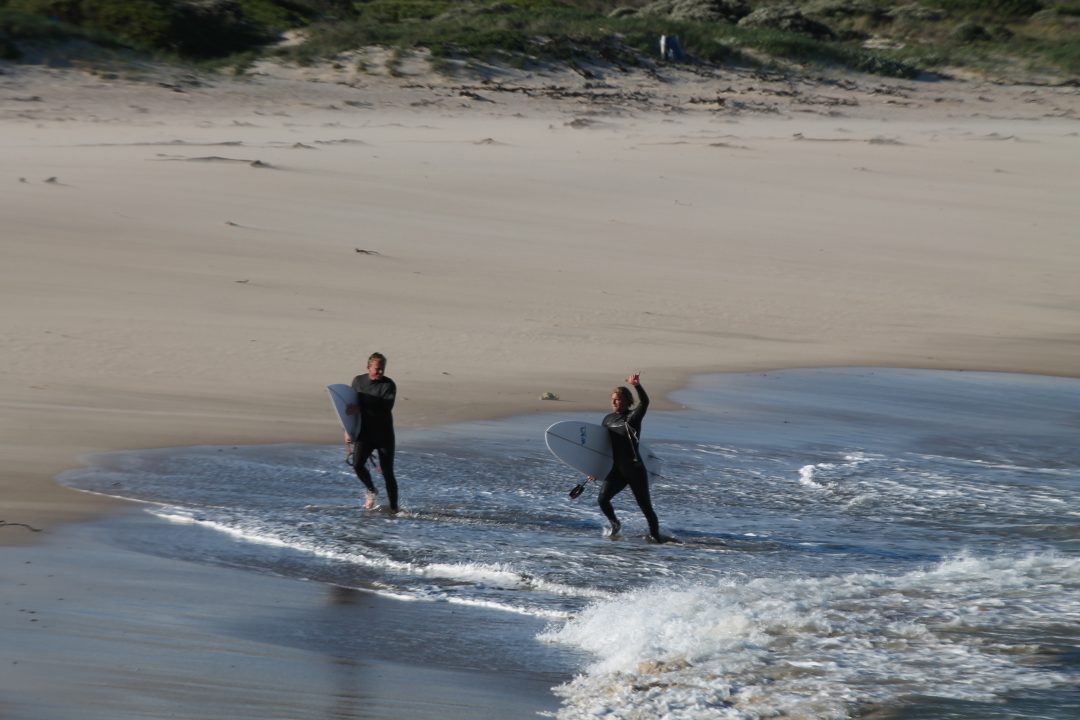Are you planning your next winter surfing holiday or considering a cold water surfing session at the local spot that you’ve been avoiding since the ocean water temperatures dropped? Not sure how to take the plunge and get out there, despite the icy waters? We get it. Freezing waters can be almost enough to put you off altogether. Almost. But we all know a bit of cold is not a good enough excuse to skip a thick swell with pumping offshores.
So, before you pack away your boards for the winter, try these tips to make cold water surfing more enjoyable.
Did you know that your mind can only occupy one thought at a time? It’s true. So, if you’re thinking about the uncrowded and perfect waves you’re about to score, you (scientifically) cannot be thinking of how cold the water is. Keep your mind on the good stuff, and the cold will take a backseat.
Some surfers treat cold water surfing as a form of meditation. They see it as a way to challenge themselves both mentally and physically, to focus only on the present moment. They focus only on one thought process or one activity (surfing), and do not allow themselves to think about the low ocean water temperatures. If you live in a cold part of the world or are planning a surfing holiday to a cold water surfing destination, it might be time to find your zen.
It’s important to stretch before you do any form of exercise, but especially when you’re braving cold water conditions.
Why? When you dive into icy water, your body’s natural defence mechanism is to reduce blood flow to your skin and extremities; the aim is to reduce heat loss from the skin, and keep warm blood in your core to protect vital organs. The problem is, this can make your hands and feet numb and pretty difficult to use (which kind of defeats the point of surfing in the first place). If you warm up before you head into the water, your blood is pumping strongly from the start- which means your hands and toes will stay useable for longer.

A good quality neoprene warm water suit is so important when surfing cold water waves. Try and get a suit that’s flexible and light, while offering the insulation and toastiness you need. Look for something that’s liquid sealed and zipper-less for maximum protection from the icy water. Have a look at Zion’s latest cold water wetsuits for surfing here.
Paddle around in between sets, to keep your blood flowing. Don’t come out the minute you start to feel cold. Chances are if you keep moving your body will acclimatize and you will be more comfortable after a few minutes.
Coming out of cold water is often the worst part, so make sure you’re prepared for it. Place a nice warm towel and layers of dry warm clothes, gloves and a beanie in an easily accessible area of your car. If you’re fancy, you can even put a warm water bottle over your clothes, so they’re nice and toasty when you come out of the Atlantic freezer.
Once you’re layered up properly, jump into the car, blast the heat and bask in the success of tackling the cold without flinching for a second.
One of the biggest hesitations for guests looking to visit and surf Africa, is the atlantic ocean temperature. South Africa Surf Tours specialises in guided surf holidays in South Africa and Namibia. Now, we’re not going to lie to you and tell you that the water temperature is always toasty and tropical. It’s not. But it is also not as bad as people believe it to be. A little known fact is that the Cape Town sea temperature actually tends to increase during the winter months. Yes, you read that correctly. The water gets warmer as the outer temperatures get colder.
The swell also tends to be a lot better during the winter months in South Africa, particularly on the West Coast and heading towards Namibia. This makes it the perfect destination for a winter surfing holiday. With average ocean temperatures ranging between 13 and 17 degrees, a 4/3mm wetsuit will be enough to keep you out in the water having a bloody good time!
Keen to start planning your trip to our winter wonderland? Get in touch below and we will help you plan a custom surf holiday in South Africa or Namibia.
